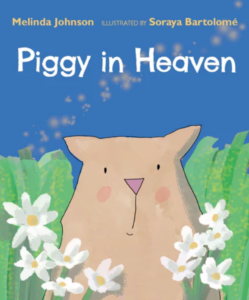His Eye is on the Sparrow
This week’s blog is written by Melinda Johnson, author of “Piggy in Heaven,” coming soon from Paraclete Press!
—
“When Jesus is my portion, a constant friend is He. His eye is on the sparrow, and I know He watches me.” – Civilla Durfee Martin, His Eye is On the Sparrow, 1905
We don’t take small animals seriously. If you’re an adult who owns a hamster, you’re probably the only one you know. At the movies or in the library, it’s easy to find a horse or a dog saving the hero’s life or demonstrating wisdom and loyalty. Epic tales about small herbivores are hard to come by. We expect to find these little creatures in cartoons and picture books or serving nobly as the comic relief. In a serious story, you might find a canary or a perky rat accessorizing a character the author hopes will be eccentric.
I have been the fortunate human guardian of, at various times, two bunnies, seven hamsters, a rotating selection of fish, and one guinea pig. All of these animals are considered children’s pets – small, adorable, and inconsequential. Yet I learned important things from each of them, and these epiphanies built on each other into a staunch belief that the tiniest members of creation are as precious and intelligent as the largest and most obviously heroic. Caring for these little pets through their lifetime and at the moment of their death has taught me beautiful lessons. I will share three with you here.
God is in the details.
Two of our tiny friends were dwarf, or miniature, hamsters. These hamsters are less than 3 inches long, and yet they are complete living creatures, with exquisite little eyes and hands, tiny beating hearts, and downy fur. When you hold one in your hand, she feels light and warm. Her fingernails and whiskers tickle equally and seem about the same circumference. If you can keep your eyes on the shy, busy little animal and let your mind leap outwards to the edges of the cosmos, you can begin to see what a miracle she is. Think of the painstaking attention it took to create one hamster. Think how many hamsters have graced our planet since time began. And that’s only hamsters! What about bunnies? Birds? Caterpillars? Lemmings? Think of every little voiceless creature you pass without seeing every day. They are all testaments to the infinite, loving creative Essence who could invent life in such diversity and detail.
Words are not the only measure of intelligence.
One of the first ways a child learns to distinguish between humans and animals is language. “I love my doggy, but he doesn’t talk.” Animals are a long step up from toys, which don’t talk or move, but that absence of words is a disappointment.
We grownups publish books and articles about animal intelligence, and we consider it newsworthy because it surprises us. Who would think a crow could make a tool? How amazing that dolphins use their own language! What if dogs can discern right from wrong? I believe our surprise results from our strong tendency to perceive animals as lesser editions of ourselves, rather than as separate and inherently mysterious creatures. Little by little, we are learning to ask how an animal expresses its inner life, instead of assuming it does not have one. We hamper these efforts by anthropomorphizing, often with the best intentions. We’re likely to offer mercy to an animal that seems “almost human” to us, and mercy is a good gift. But I hope we can stretch ourselves to admit how much of the world and its creatures may be outside our knowledge or in need of our kindness.
Pets are not replaceable.
I overheard a conversation once between a child and an adult. It went like this:
Adult: “I’m sorry about your hamster. Your mom told me it died.”
Child: “That’s okay. I’m going to get another one.”
I don’t blame anyone in this scenario. We all comfort our children as best we can. The words stayed with me because they reflect the way we gloss over the individuality of small animals. If no two snowflakes have ever been alike, no two hamsters have ever been alike. Every animal is a single instance.
Every death leaves an empty space, even the death of a miniature hamster, a bunny, or a guinea pig. You are left with love that has no outlet, and your heart hurts. A new pet is wonderfully healing, but it is a new pet; it is not the old one back again. We lessen our ability to understand and treasure life if we reduce it to a mass-produced commodity.
So when I think of that old hymn about the sparrow, and I reflect on the beloved little animals who have shared our home, I remember that not one sparrow falls to the earth outside the Father’s care. Yes, Jesus says we are “of more value than many sparrows,” but in the same moment, He is telling us that He loves the sparrows, too.

